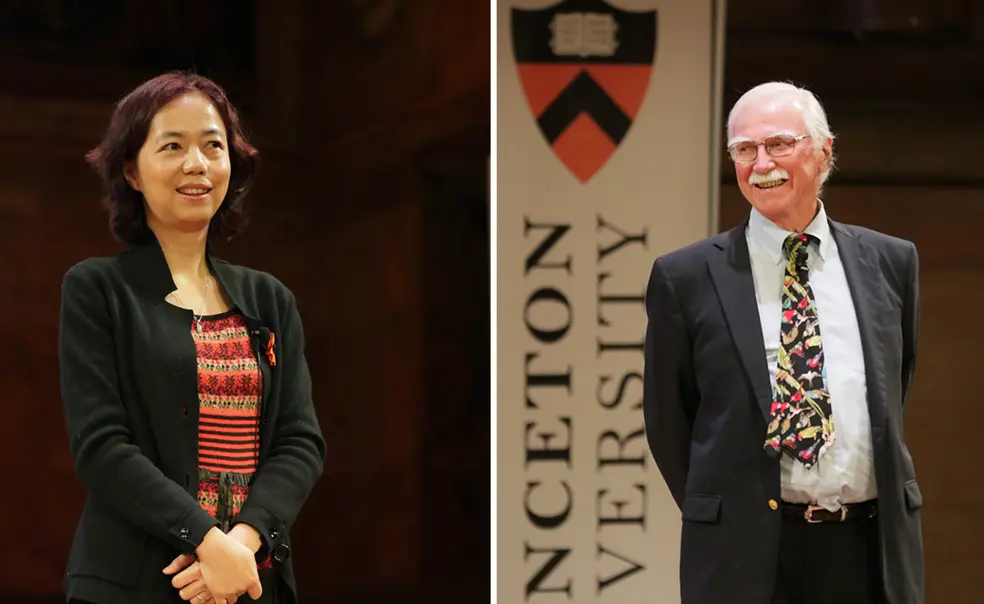Princeton Celebrates Award-Winning Scholars at Alumni Day 2024
Wilson Award winner Fei-Fei Li ’99, Madison Medalist John Fitzpatrick *78 speak about their paths in science
You never know what you’ll learn at Alumni Day, the University’s annual cerebral celebration, held on Feb. 24. For example, Princeton has a curling team. President Christopher Eisgruber ’83 confessed this was news to him, too, as he listed the extracurricular pursuits of Brian Sheng-Kai Li ’24, a comparative literature major and one of two recipients of the University’s highest undergraduate distinction, the Pyne Honor Prize.
“And because this is Princeton University,” Eisgruber said, “we not only have a curling team, we are good at it: Brian and his teammates captured the silver medal at last year’s national collegiate curling championship!”
The other Pyne Prize honoree, sociology major Casey Beidel ’24, recalled that his first exposure to Princeton was a rain-soaked Orange Key tour led by Paige Allen ’21, who also won the Pyne Prize. Beidel is an Orange Key guide as well, so perhaps another Pyne winner will be able to share a similar story a few years from now.
The top alumni honorees, Woodrow Wilson Award winner Fei-Fei Li ’99 and James Madison Medalist John Fitzpatrick *78, were recognized for extraordinary contributions to their scientific disciplines.
Li, a computer science professor at Stanford and co-director of its Human-Centered AI Institute, has led pioneering advances in artificial intelligence and computer vision. Fitzpatrick, a professor of ecology and evolutionary biology at Cornell and director emeritus of the Cornell Lab of Ornithology, has been a dedicated researcher and conservationist and a leader of citizen science projects. Both delivered lectures to a nearly full house at Richardson Auditorium.
Fitzpatrick noted that he was the first ecology and evolutionary biology graduate to win the Madison Medal, which has been awarded annually to graduate alumni since 1973. “I am thrilled and honored by the choice of a ‘bird guy’ to receive this award,” he said.
Birds are “fantastic models for how nature works,” he said, providing vivid illustrations of global annual cycles and serving as sensitive environmental indicators. In recent history, what they have indicated is alarming: A 2019 Sciencepaper found that the North American bird population has lost nearly 3 billion birds, about a third of all breeding adults, since 1970, across nearly all habitats. Ornithologists are studying the human factors at work in this trend, including massive centers of light that disrupt migration, mercury contamination, habitat loss, and the use of certain pesticides.
Birds have also shown an extraordinary ability to inspire citizen scientists — from adventurous birders to those pouring seed into their backyard feeders — who build remarkable data sets from their observations. The Cornell Lab of Ornithology, recognizing that potential in 2002, created eBird, an interactive site for recording bird sightings. Now, it is the world’s largest citizen science project and collects more than 100 million bird sightings per year.
“We are at the opening now — just the opening — of what will become a global opportunity to look at very fine detail of what bird populations are doing and measuring what they’re telling us about their local situations — some good, some worrisome, some downright catastrophic,” Fitzpatrick said.
Li, a physics major as an undergraduate, recalled that Princeton was one of the first places she visited after her family immigrated to New Jersey from China when she was 15. It was, after all, Einstein’s intellectual home — and “the dinosaur exhibit was free.”
More than a decade later, Li was a member of Princeton’s computer science faculty when she and her colleagues developed ImageNet, a collection of 15 million digital images intended to capture the diversity of the visual world and serve as a “training dataset” for object recognition, a key thread in artificial intelligence.
ImageNet has been used to help computers see what humans see, Li said, paving the way for a next step: building AI to see what humans don’t see. She explained the phenomenon of “change blindness,” in which we often don’t notice a major change in our visual field, and how this can lead to mistakes in high-intensity situations, such as an operating room. AI could help surgery teams keep track of instruments and avoid medical errors, for example. Researchers are also building AI to augment human capabilities, Li said, with applications that could allow people with disabilities to use brain waves to control robotic limbs.
Li said that in all cases, the development of AI should “be guided by concern for human impact. It should strive to augment and enhance humanity, and it should be inspired by our human intelligence — both emotional and cognitive.” With that in mind, her work at the Human-Centered AI Institute has drawn on expertise from a wide range of fields, including medicine, law, neuroscience, social sciences, and the humanities. Her memoir about that work, The Worlds I See: Curiosity, Exploration, and Discovery at the Dawn of AI, will be the Pre-read for Princeton’s Class of 2028.
More than 1,000 alumni and guests attended the Alumni Day festivities, which included the morning program at Richardson and a luncheon in Jadwin Gym. In addition to the alumni honorees and undergraduate Pyne Prize winners, four doctoral students were presented with Jacobus Fellowships, which fund the final year of graduate school: José de Jesús Montaño López (chemical and biological engineering), Geneva Smith (history), Pasquale Toscano (English), and Ryan Unger (mathematics).
After lunch, the University paid tribute to alumni, faculty, and staff who died in the last year at the annual Service of Remembrance in the University Chapel. At a closing reception in Chancellor Green, attendees celebrated the work of the Princeton Prize in Race Relations, a program created by alumni to highlight the work of high school students around the country, which completed its 20th year in 2023.










No responses yet